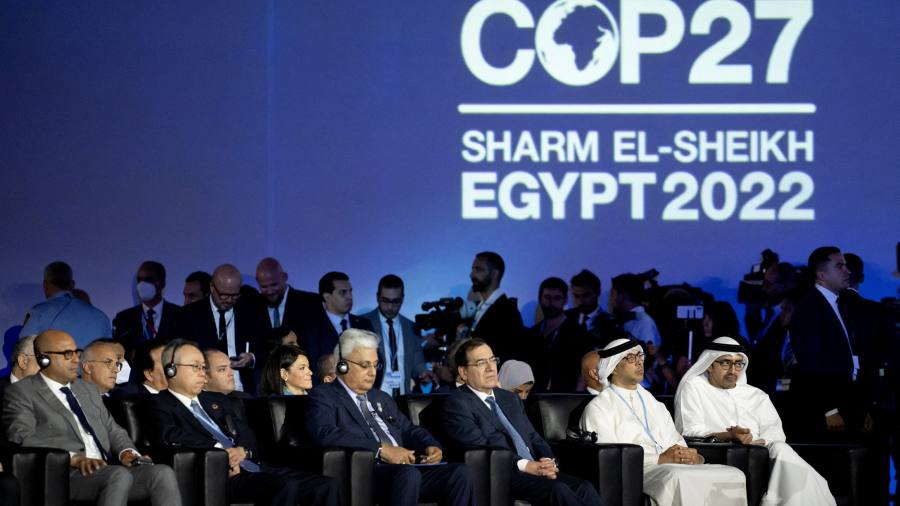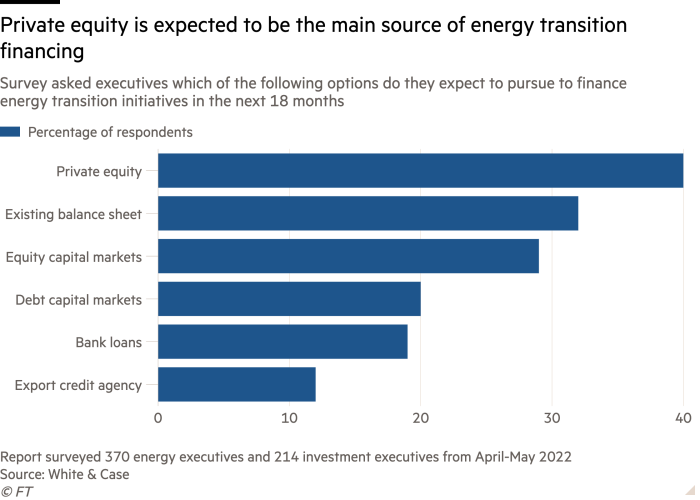
This article is an on-site version of our Energy Source newsletter. Sign up here to get the newsletter sent straight to your inbox every Tuesday and Thursday
Hello and welcome back to Energy Source.
Control of Congress and statehouses across the US hang in the balance as Americans cast their ballots in midterm elections today. Polls point to a good night ahead for Republicans, who look poised to win back control of at least the House of Representatives and possibly the Senate as well. We looked at what that could mean for American energy last week. Follow FT.com for news and analysis as the results roll in.
But the vote will also matter at least as much for the environment. If the Donald Trump-dominated Republican party regains control of Capitol Hill, the news will send shivers across the Atlantic to Sharm el-Sheikh.
That’s where the climate talks are already under way — and it’s our focus today. The energy crisis is the elephant in the room. The UN is calling for accelerated emissions cuts and hundreds of billions of dollars in rich country funds to help developing nations deal with climate change. Both will be a hard sell as the world deals with the insidious economic and political damage from energy inflation.
I’d also recommend tuning into our friends over at Moral Money, who are on the ground in Sharm el-Sheikh and will have daily dispatches from the climate talks. You can sign up for Moral Money by clicking here.
Thank you for reading. — Justin
Energy inflation is undermining the climate talks
The big UN COP27 climate conference has kicked off in Egypt’s resort town of Sharm el-Sheikh as presidents, prime ministers and chief executives jet in to rally support for the climate fight.
A pair of UN reports ahead of the conference sought to focus the agenda. The first underscored the need for bigger and faster emissions cuts. The second called on rich countries to step up their support for poorer nations dealing with the destructive fallout from climate change.
Both are going to be a hard sell at a time of high energy inflation and political upheaval brought on by Russia’s war in Ukraine.
The UN’s “Emissions Gap” report argues that nothing less than “multiple major transformations must be initiated in this decade, simultaneously across all systems”, including transportation, electricity, buildings and industry, to accelerate emission cuts.
As it stands, the world is still far from being on a path to limiting global temperature increases to 2 degrees Celsius, let alone the 1.5C target climate scientists prefer, the UN report finds.
A few leaders at Sharm el-Sheikh can at least point to some domestic climate successes. US president Joe Biden eventually managed to pass the Inflation Reduction Act, which is set to funnel hundreds of billions of dollars into wind and solar power, batteries, hydrogen, carbon capture and storage and other green technologies in the coming years. The EU has stepped up its ambitions for clean energy deployment as it looks to replace Russian gas after Moscow’s invasion of Ukraine. China’s car fleet is going electric faster than anyone expected. Globally, renewable energy is clearly on the rise.
Yet emissions are still going up and the energy crisis has clearly undermined the climate conversation for now, even if there is hope that it will accelerate the transition to greener fuels over the long run.
Biden has been forced to plead with domestic oil producers, Saudi Arabia and other Opec+ countries to lift crude supply to tamp down high fuel prices, which have sapped the political capital he needs to continue to pursue his climate agenda. He has also become a cheerleader for the nation’s booming liquefied natural gas export industry.
Europe, meanwhile, is ploughing billions into new fossil fuel infrastructure as it scrambles to replace Russian natural gas supply. It’s been forced to turn back to coal plants to keep the lights on.
Developing countries — especially major emitters China and India, whose leaders are not even attending this year’s climate gathering — will not ignore that when push came to shove, the US and Europe put energy security above climate change — even when it meant higher emissions.
The UN’s “Adaptation Gap” report, meanwhile, is likely to take up more of the conference’s air time. It calls on rich countries, which are largely responsible for the carbon emitted into the atmosphere, to step up support for poorer ones dealing with destruction from extreme weather events, such as the floods that devastated Pakistan.
It says developing countries will need $160bn-$340bn a year by 2030 and $315bn-$565bn annually by 2050 to adapt to a shifting climate — that’s five to 10 times more than the money flowing now.
But promises of a big cash transfer is going to be a tough sell to voters in the US and Europe struggling with decades-high inflation, driven in large part by energy prices.
Boris Johnson, the former British prime minister, said at COP27 that the UK did not have the financial resources to pay climate “reparations”, adding climate action had been one of the “most important collateral victims” of Russia’s invasion of Ukraine.
“Per capita, people in the UK put a lot of carbon in the atmosphere,” said Johnson. “But what we cannot do I’m afraid is make up for that with some sort of reparations, we simply do not have the financial resources.”
Other western leaders may not be so vocal about it — but at a time when inflation has governments around the world on the back foot, it will be difficult to marshal major new resources for the climate fight in other countries.
The US elections, which are expected to put Republicans back in the majority in Congress, will further undermine the climate effort and serve as a reminder that the US is a fickle ally in the fight.
Added to this, the return to power of a Republican party openly hostile to international climate action — and now in control of the government’s purse strings — would only undermine any agreements Biden hopes to make at the conference.
It will also raise the prospect that an ascendant Republican party, potentially led again by former president Donald Trump, could win back the White House in 2024 and return to running interference at global climate talks. (Justin Jacobs)
PS Join Edward Luce, Rana Foroohar, James Politi and veteran commentator Norm Ornstein on November 10 for a subscriber-exclusive webinar staged with the Swamp Notes newsletter to discuss the US midterm results. Register free today here and submit your questions in advance for our panel.
Data Drill
Financing the clean energy transition is becoming top of mind for industry executives and investors. According to a new report by international law firm White & Case, 42 per cent of energy executives say investing in the transition is a high priority, up from 14 per cent in 2020.
Carbon capture is expected to make up a bulk of these investment projects. Forty per cent of executives said they intended to invest in carbon reduction technologies in the next 18 months, second behind greenfield renewables. The report surveyed 370 oil and gas companies and utilities, along with over 200 investors worldwide.
Private equity will be the most common source for financing, with 40 per cent of executives expecting to access private equity investments in the next 18 months.
“A lot of these capital providers are seeing opportunities in changing their business model to get in earlier,” said Michael Watson, partner and head of energy transition at White & Case.
Engagement overshadowed divestment among companies and investors. Forty-five per cent of investors said they engage with emissions-intensive companies to lower their emissions, compared to 34 per cent of investors who said they divest. (Amanda Chu)

Power Points
-
The US and Europe are clashing over allegations that American natural gas companies are profiteering off soaring prices on the continent.
-
US climate envoy John Kerry will announce a new carbon credit scheme at COP27 to help developing countries fund clean energy projects.
Energy Source is a twice-weekly energy newsletter from the Financial Times. It is written and edited by Derek Brower, Myles McCormick, Justin Jacobs, Amanda Chu and Emily Goldberg.
Recommended newsletters for you
Moral Money — Our unmissable newsletter on socially responsible business, sustainable finance and more. Sign up here
The Climate Graphic: Explained — Understanding the most important climate data of the week. Sign up here